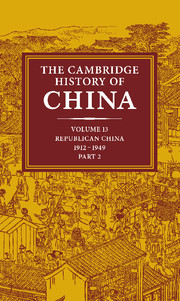Book contents
- Frontmatter
- 1 Introduction: perspectives on modern China's History
- 2 China's international relations 1911–1931
- 3 Nationalist China during the Nanking decade 1927–1937
- 4 The Communist movement 1927–1937
- 5 The agrarian system
- 6 Peasant movements
- 7 The development of local government
- 8 The growth of the academic community 1912–1949
- 9 Literary trends: the road to revolution 1927–1949
- 10 Japanese aggression and China's international position 1931–1949
- 11 Nationalist China during the Sino-Japanese War 1937–1945
- 12 The Chinese Communist movement during the Sino-Japanese War 1937–1945
- 13 The KMT-CCP conflict 1945–1949
- 14 Mao Tse-Tung's thought to 1949
- Bibliographical Essays
- Bibliography
- Conversion table: pinyin to Wade-Giles
- Index
- Republican China - physical features">
- References
4 - The Communist movement 1927–1937
Published online by Cambridge University Press: 28 March 2008
- Frontmatter
- 1 Introduction: perspectives on modern China's History
- 2 China's international relations 1911–1931
- 3 Nationalist China during the Nanking decade 1927–1937
- 4 The Communist movement 1927–1937
- 5 The agrarian system
- 6 Peasant movements
- 7 The development of local government
- 8 The growth of the academic community 1912–1949
- 9 Literary trends: the road to revolution 1927–1949
- 10 Japanese aggression and China's international position 1931–1949
- 11 Nationalist China during the Sino-Japanese War 1937–1945
- 12 The Chinese Communist movement during the Sino-Japanese War 1937–1945
- 13 The KMT-CCP conflict 1945–1949
- 14 Mao Tse-Tung's thought to 1949
- Bibliographical Essays
- Bibliography
- Conversion table: pinyin to Wade-Giles
- Index
- Republican China - physical features">
- References
Summary
The decade between the first and second united fronts, from the KMT-CCP break-up in mid-1927 to mid-1937, was a time of disaster, trial and tribulation for the Communist movement that brought it close to extinction. Yet from this period emerged an experienced and tested leadership with a capacity not only to survive but to win power. The severity of the problems met and surmounted by the CCP in these years can be best understood by looking first at its crisis of membership and organization.
RECONSTITUTION AND LEADERSHIP OF THE PARTY
In brief, the CCP from its Second Congress in 1922 had been a branch of the Communist International (CI) which, in spite of differing views occasionally expressed by Chinese leaders, had its way throughout the period of the first united front of 1923–7. After 1927, however, the prestige of the CI plummeted and vigorous efforts were needed to restore it. This meant the deposition and criticism of Ch'en Tu-hsiu, the recall and rebuke of Ch'ü Ch'iu-pai, the trial of Li Li-san; more significantly, this also meant the convocation of the Sixth Congress in Moscow and the reconstruction of the party presided over by Pavel Mif. From the autumn of 1927 to January 1931 the CI's interference in the affairs of the CCP virtually reduced the Chinese party to the status of a ‘colony’. After the fourth plenum of January 1931, however, the CI's influence over the CCP declined, due to complex factors, including Stalin's increasing preoccupation with Russian and European affairs, the destruction of the liaison organization in Shanghai by the KMT police in the summer of 1934, and Stalin's bloody purges that by 1937 had rendered the CI an unreliable vehicle for transmitting his policies.
Keywords
- Type
- Chapter
- Information
- The Cambridge History of China , pp. 168 - 229Publisher: Cambridge University PressPrint publication year: 1986
References
- 1
- Cited by

